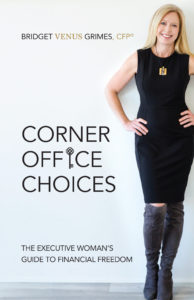Is financial advice for women, specifically, something we need?
 Even though I have a whole support network centered around my life as a working woman: a physical therapist specializing in working moms with postpartum pain; a chiropractor for the same thing; my own mom, who picks up my kids when I have to work late, etc, etc. I hadn’t really considered the specialization, until speaking with Bridget Venus Grimes, CFP, a few weeks back.
Even though I have a whole support network centered around my life as a working woman: a physical therapist specializing in working moms with postpartum pain; a chiropractor for the same thing; my own mom, who picks up my kids when I have to work late, etc, etc. I hadn’t really considered the specialization, until speaking with Bridget Venus Grimes, CFP, a few weeks back.
I love reading investment articles and books, learning about investors, and consider a Friday night with my Mint dashboard a success. But until I talked to Bridget, I had been considering the whole topic of finance more academically. I’m into the principles of money, and love the occasional case study, but I hadn’t really drilled down into the nuances that she opened my eyes to.
As the founder and president of WealthChoice, a firm focused on helping women turn their professional success into financial success, this is Bridget’s jam. I was almost alarmed when asked if I knew the biggest financial-planning obstacles standing in the way of women— executive-level women specifically. I hadn’t thought about it.
What else to do, but turn the tables? I asked Bridget to familiarize me with the basic financial advice for women that she shares most often.
Financial Risk for Women
PS: What are the distinct financial risks women face, women executives even more so?
BG: There are a host of financial risks women face: longevity; higher health care costs later in life; additional expense when filing as “single” (whether related to divorce or the loss of a spouse) which costs them significantly; They work an average of 12 less years than men due to taking time off during their career for family obligations, which means they have less saved for retirement; they’re often paid less, and more.
Women executives also face the issue of not having professional advocates, which leads to challenges related to getting paid what they’re worth, and getting the roles and promotions they want in their industry. By making less, they leave on average $1 million on the table.
This is often the result of not negotiating pay, not getting raises, not being able to save more, lost growth of portfolio, and working fewer years. Women execs have a confidence gap, which gets in the way of career and business advancement.
They are excluded from critical male networks at their firms and in industry, that are necessary for business and career success.
Financial Planning for Women
PS: Why doesn’t traditional financial planning address these risks, and what unique advice do you have for filling this void?
BG: Traditional financial planning is focused on saving for retirement, for the future. It’s about putting off life now for life later. We need planning to focus on the many competing needs women and women executives have.
Many women execs plan to continue to work in some capacity later into life, and planning needs to focus on this. Planning also should be around how to help a client leverage their business or career, not only from a compensation standpoint, but also from a quality of life standpoint.
And planning really needs to include an emphasis on budgeting. Many make a good amount of money, but have little to show for it. By working with clients on cash flow management, you can help them choose how to allocate money to the goals that are more important to them. Lastly, if we know that women have distinct financial risks, such as longevity, we need planning and investment management to take this into account.
Habits for Financial Planning
PS: What are some of the main practices or habits you recommend that busy women develop around financial planning?
BG: For my clients, budgeting becomes a new habit, along with an awareness around where you spend your money. The sense of empowerment around these financial habits is critical as well here because you can choose where your money goes. I also think engaging with their plan often is important. It’s why we have a one-page document that distills everything they are working on.
They can reach for this during the month to keep themselves on track. We also recommend becoming part of a network of women you resonate with. This provides peer-to-peer mentoring, support, and sharing of best practices. It truly helps fill the voids that our companies and our jobs create. And we encourage all clients to think through, in great detail, what their goals are.
This drives everything we do, so knowing what you want and when, helps create the action steps needed to actually reach those goals.
BRIDGET VENUS GRIMES, CFP® is the founder and president of WealthChoice, a firm focused on helping women turn their professional success into financial success, and author of Corner Office Choices: The Executive Woman’s Guide to Financial Freedom. She is also a cofounder of Equita Financial Network, Inc., a network of independent, women-led financial planning firms that share best practices and common goals. As an advisor to top-earning female executives, business owners, and attorneys, Grimes draws on more than a decade of experience to create customized financial solutions that help her clients achieve the life they long for. Based in San Diego, California, she enjoys cooking, entertaining, and spending time on the water in the company of her husband and children. Learn more at www.wealthchoice.com.






Leave a Reply